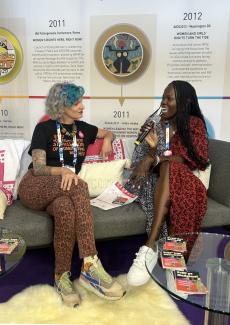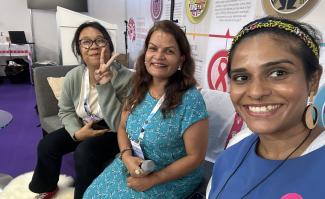On World AIDS Day, December 1st, 2024 AWID, along with partners, is hosting Moving Money, Building Movements one day prior to the 15th International AWID Forum. We wanted to highlight the important calls to our partners by @Red Umbrella Fund and @Stephen Lewis Foundation who earlier this year wrote an important article on why HIV was a feminist issue that funders needed to invest in. This article is a reflection that builds on this call to action starting from AWID’s engagement and reflections from the 25th International AIDS Conference held July 22nd - 26th, 2024 in Munich.

For the past four decades, pharmaceutical companies, private sector, governments and chronic and widespread “white-saviorism” have profited immensely off of the bodies and challenges of people living with HIV and key populations (those most impacted) - sex workers, people who use drugs, gay men and trans people. At the peak of the response, AIDS was so globally important that from 2000-2015 the Millennium Development Goals (MDGs) featured HIV/AIDS as one of eight focused targets agreed to and prioritized by all 191 UN state members1. Money poured into the HIV sector, and business was booming but only for some (see list above).
There is a reason that the International AIDS Conference has historically been one of the largest conferences in the world drawing over 15,000 participants. Where invested wisely (often in community-led or partnered programs and services), the steady influx of money has led to overall improvements, with HIV acquisition rates including vertical transmissions and new infections drastically reduced in many places and fewer AIDS related deaths as people living with HIV are living longer.
Medicine is essential, amazing and appreciated, especially when it makes it into the hands of those who most need it. The focus on HIV and targeted interventions has had an impact that bears a stark difference to the early days of the pandemic and makes HIV- a long term chronic illness - one that can be managed with access to treatment. It is somewhat understandable that other movements, other people outside (and inside) the HIV response, have experienced AIDS ‘fatigue’. Also confusing is UNAIDS and other partners using terminology about the ‘End of AIDS’ – which unfortunately contradicts the reality that, similar to the 2015 targets, the 2030 targets will not be met.
Funders Concerned About AIDS’s most recent Philanthropy's Response to HIV and HIV: 2022 Grantmaking shared that there was a whopping 45% decrease in funding for women and girls living with HIV in 2022 and the impacts of long-standing funders such as Open Society Foundations drastically reducing their funding towards the HIV response2. This presents a stark dissonance to the idea that HIV responses and movements - especially community-led ones - are well-funded.
HIV and feminism?
It is interesting how little HIV is ever referenced in feminist spaces. HIV is seen as a health issue, seemingly separate from any social implications of structural enablers. Some of the key feminist issues seem to be missing any analysis of HIV, and therefore invisibilize the lived experience in particular, women living with HIV.
Take feminist discourse on labor rights as a case in point. At AIDS 2024, in the Women’s Networking Zone3, AWID was asked to facilitate a session titled ‘Invisible in Feminist Labour Rights Movements’. The session was crafted by feminists living with HIV, sex workers and people who use drugs to highlight some of the gaps in feminist discourse about labor rights4. Advocates stated that feminist movements do not take into account how communities who are criminalized experience labor rights in practice.
Examples of how international HIV travel restrictions5 and mandatory or forced HIV testing of workers6; in particular migrant workers, domestic workers, sex workers and other informal workers can drastically limit employment opportunities and further marginalize these workers. Often random drug testing can be a barrier to employment. In many countries people who use drugs are incarcerated for petty, non violent drug offenses likewise restricts employment options (for life in some jurisdictions). Laws that penalize people who support or buy sex, similar to women working in the drug industry, generally cause more harm and unsafe environments for those they are intending to “protect”.
The session also talked about how for many women and trans people whose literal existence is criminalized, the only work that is possible is informal work that is often low paid, without insurance or social protections, and can be dangerous. Still in 2024, people living with HIV in many places cannot handle food, work in healthcare, join the army or police forces and this is not even talking about the actual workplace practices that are often much worse7. These have broader implications to family and community engagement, increased stigma and discrimination as well.
SRHR and Bodily Autonomy
Another important feminist issue that often ignores the lived experiences of women living with HIV and key populations, is sexual and reproductive health and rights (SRHR) and bodily autonomy. Reproductive justice has been one of the cornerstone issues of feminist movements, but interestingly women living with HIV - especially those from key populations continue to experience regular violence at the hands of healthcare workers.
At AIDS 2024, ICW launched Confronting Coercion: A Global Scan of Coercion, Mistreatment and Abuse Experienced by Women Living with HIV. The report highlights alarming rates of abuse from health care workers telling women living with HIV not to have sex, to coerced sterilizations. In some Latin American countries for example, 14% of women living with HIV were coerced into being sterilized during their pregnancy in the past year. In the report, the intersection of being a sex worker, using drugs, and having disabilities increased the risk of coercion in health care settings. The report dramatically underscores the need for the feminist movement to reflect on how they have been engaging with feminists living with HIV. As one activist said in the session, “In Latin America we have a saying, ‘your feminism needs more HIV’, because they completely don’t engage with us on these issues.”
While many feminist movements do not have a strong analysis of HIV beyond it being a health issue, from criminalization to labor rights, from climate justice to bodily autonomy - it was very clear that women living with HIV and key populations are keen to be included in feminist movements. Bringing in their wealth of knowledge about intersectionality, tracking anti-rights actors and of course doing important community-led movement building in the margins. In the Women’s Networking Zone, we celebrated with the many feminists who have found each other in the HIV movement and hope that others can see how HIV is a feminist issue that we should all care about and add to our feminist analysis. We hope that we can carry this message through the AWID Forum and beyond.
Special thanks to collaborators from the team at ICW and WHRIN.
Jessica Whitbread works in the Membership and Constituency Engagement Team at AWID. AWID’s membership team were active participants in the Women’s Networking Zone organizing committee, led for 20 years by two of our members, the International Community of Women Living with HIV (ICW) and the ATHENA Network.
1 https://www.un.org/millenniumgoals/
2 Harm Reduction InternationalFunding Report, 2024. HRI_Funding-Report-2024_AW_080724.pdf
3 The Women’s Networking Zone is a self declared feminist space collaboratively organized by the ATHENA Network, the International Community of Women Living with HIV (ICW), and dozens of other women and trans-led grassroots networks for 20 years in the Global Village at the International AIDS Conference.
4 Session Description: The feminist movement has long been a supporter of women’s labour rights but has ignored many of the intersecting issues that womxn from key populations experience, such as forced testing and hostile illegal policies. In this session we will hear from womxn living with HIV, sex workers, and womxn who use drugs about the gaps they see in feminist labour discourse. Session led by the International Community of Women Living with HIV (ICW), Women and Harm Reduction International Network (WHRIN), South African Network of People who use Drugs (SANPUD), Drug Policy Advocacy Group Myanmar and the Global Network of Sex Worker Projects (NSWP).
5 https://travelrestrictions.unaids.org/v
6 Current example in Uganda: https://deeply.thenewhumanitarian.org/womenandgirls/articles/2017/08/14/fired-after-forced-hiv-tests-ugandan-women-head-to-court
